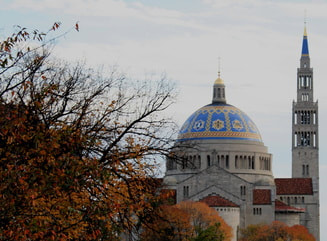|
In my own prayer this summer, I’ve been using a collection of prayers from the great American Catholic writer, Flannery O’Connor. The prayers were part of a journal that was recently found among her papers. They are the prayers of a young struggling writer who wants her faith to inform her writing and her writing to be a work of faith. The collection is called A Prayer Journal.
In one of the journal entries she is writing about the importance of a thread in writing a novel. The thread, she writes is “a view of the world behind it & the most important single item under this view of [the] world is the conception of love—divine, natural, & perverted” (O’Connor 30). She continues to reflect on how many of our great writers, Freud, Proust, Lawrence “have located love in the human & there is no need to question their location; however, there is no need either to define love as they do—only as desire, since this precludes Divine Love, which while it too may be a desire, is a different kind of desire—Divine desire—and is outside of man and capable of lifting him up to itself” (O’Connor 30). O’Connor saw this way of defining love as primarily an emotion as a real problem for the modern heart, which was becoming increasingly “divorced from faith” (O’Connor 31). She writes “The modern man isolated from faith, from raising his desire for God into a conscious desire, is sunk into the position of seeing physical love as an end in itself” (O’Connor, 31). This, though written more than 50 years ago, is at the heart of the debate today on the definition and meaning of marriage. Recently, I was asked to be part of a panel at the Catholic Information Center reflecting on the impact of the Supreme Court’s decision to legalize same-sex marriage. I was asked to address the theological and pastoral implications of the decision. One of the pastoral implications is both a challenge and an opportunity to give witness to that which makes a sacramental marriage different. I suggest what makes a sacramental marriage different is the way in which the Church understands love. As Flannery O’Connor writes, the love we are called to share in marriage is a divine love. Married love is a self-sacrificing and self-giving imitation of Jesus’ self-giving love. The married love of man and woman couple is a visible sign for the world of God’s faithful and fruitful love. What made this presentation so interesting was the centrality of defining what love means and what love has to do with marriage. Please follow this link to view the complete presentation which includes President John Garvey of The Catholic University of America and Helen Alvaré, of George Mason University. Susan Timoney is Secretary for Pastoral Ministry and Social Concerns for the Archdiocese of Washington, teaches spirituality for Saint Joseph’s College Online, and a Catholic Apostolate Center Advisor. This blog post was first published on August 9th on the St. Joseph’s College of Maine Theology Faculty Blog. Click here to learn more about our cooperative alliance with St. Joseph’s College Online.
0 Comments
As Catholics, we have the great fortune of having at our fingers an inexhaustible treasure trove of prayers to guide us in countless meditations, devotions, intercessions, and spiritual exercises. All of it is oriented to helping us recognize and remember God’s presence in our lives, and to call upon Him in thanksgiving, praise, petition, intercession, or blessing and adoration. The Church, of course, does not hold a monopoly over the varying forms of prayer but continues to invite the faithful to contribute to her wealth and so grow in holiness and piety. As one makes his or her journey of faith, he or she will invariably develop preferences in offering prayers to the heavens which likely change as that person matures or has different experiences in life. Exposing oneself to the diversity of prayer is a wonderful thing as it allows one to personally discover and experience new dimensions of spirituality in our Faith.
Growing up, I had been accustomed to vocal prayer as it gave a feeling of substance to my calling upon the Lord and His response. For example, I would pray aloud during Mass and would hear God’s Word being proclaimed back to me. Of course, if I was not actively paying attention to that Word or if my mind or heart were absent, my prayers would be for naught and be reduced to mere words: “Whether or not our prayer is heard depends not on the number of words, but on the fervor of our souls” (St. John Chrysostom, see CCC 2700). The trouble I sometimes had with my private prayer was that I would be speaking to God without really listening for His reply. When I arrived at The Catholic University of America as a freshman I was immediately exposed to new expressions of the Faith. One of my favorite forms of prayer turned out to be radically different from everything I had encountered beforehand. At the first Praise and Worship Adoration of the year I was thrilled to be seated in the packed St. Paul’s chapel at 9 PM on a Wednesday. Even more so, I had never before experienced so much energy and emotion by a congregation (especially one consisting mainly of young people) poured into song. Immediately after the homily’s conclusion, however, the lights were turned off and everyone fell to their knees. In the darkness the only thing visible before us on the altar was the monstrance containing the Blessed Sacrament. The next ten or fifteen minutes served to introduce me to contemplative prayer, in which I was able to connect with our Lord in a new and incredibly intimate way. As St. John Vianney described the experience, “I look at him and he looks at me.” By focusing on His true and beautiful Presence before me, I forget about all the distractions in my life: the voices in my head scattering my thoughts, my desires, my worries, my exhaustion, etc. I simply place myself before Him and gaze at Him in the stillness. Scripturally, I’m reminded of Mary’s tender gazing at her Son as she held Him in her arms, both at His birth (cf. Matthew 2:11) and His death (cf. John 19:37), as well as Mary of Bethany’s gazing upon the Lord when He ministered to her household (see Luke 10:39). This silent but ineffable expression of love is not passive but an obedience— and test— of faith, especially as my senses cannot comprehend the Real Presence (see CCC 2715-2717). No matter what form of prayer one prefers, all prayer must be based in humility (see Matthew 23:12, CCC 2559-2560). It is God’s gift to us, especially since “we do not know how to pray as we ought” (Romans 8:26). As prayer is from the heart, “if our heart is far from God, the words of prayer are in vain” (CCC 2562; cf. CCC 2563). Finally, no matter what we pray for, we must never underestimate the power of our words. Pope Francis has stressed that “prayer, in the face of a problem, a difficult situation, a calamity… is opening the door to the Lord, so that He can do something. If we close the door, God can do nothing!” Like the Psalmist David sings, we can always find comfort and assurance in God’s presence: O God, you are my God, I seek you, my soul thirsts for you; my flesh faints for you, as in a dry and weary land where there is no water. So I have looked upon you in the sanctuary, beholding your power and glory. Because your steadfast love is better than life, my lips will praise you. So I will bless you as long as I live; I will lift up my hands and call on your name (Psalm 63:1-4). Thomas Wong is an undergraduate at The Catholic University of America in Washington, D.C. When he broke open the fifth seal, I saw underneath the altar the souls of those who had been slaughtered because of the witness they bore to the word of God. They cried out in a loud voice, "How long will it be, holy and true master, before you sit in judgement and avenge our blood on the inhabitants of the earth?"
(Revelation 6:9-10) As Christians, we are tasked with following the teachings of Christ over those of the world. Doing so often puts us at odds with the latter, amid accusations of fostering inequality, forcing our beliefs on others, adhering to obsolete traditions, or getting involved in matters that do not concern the Church. It’s true that there have been many efforts over the centuries to silence Christians—persecution is nothing new to the Church—but Jesus had warned that believing in Him would not make us popular in the eyes of the world (John 15:18, c.f. 1 John 3:13, 2 Timothy 3:12, 2 Corinthians 4:8-11, Revelation 2:10). The most recent evidence of persecution can be seen in the ongoing ISIS attacks in the Middle East, where people who have been living in areas that have been Christian for nearly 2,000 years are suddenly being forced to convert or die. Though this grave situation is happening half a world away, it is critical that we do not remain apathetic during our daily routines. Cardinal Donald Wuerl of Washington, D.C., in his closing remarks at The Catholic University of America’s Mass of the Holy Spirit, warned that human atrocities can occur if people remain silent about the plight of others. As Christians, we are all united in the body of Christ through our baptism (see 1 Corinthians 12:12-26, c.f. Romans 12:15) and as such, we must care about what affects another member. To that end, Saint Paul writes, “If one member suffers, all suffer together; if one member is honored, all rejoice together.” While it is easy to forget the persecution occurring beyond our borders in our comfortable day-to-day activities, we cannot simply be sorry for the terrible suffering endured by others—these are truly our brothers and sisters in the faith who need our continuous compassion and support! We may not be able to fully imagine the terror they are experiencing but we can at the very least offer prayers and sacrifices (i.e. suffer with them) on their behalf. Never doubt the value of prayer. It remains a most powerful means of comfort, hope, and strength from and in God. Pope Francis has stressed that “prayer, in the face of a problem, a difficult situation, a calamity…is opening the door to the Lord, so that He can do something. If we close the door, God can do nothing!” When we offer our prayers, we are also expressing our trust that God is more powerful than the problems presented by the world—He can bring good out of evil—as we read of many biblical miracles when God’s people prayed for deliverance and forgiveness. When we pray, we remember the needs and welfare of our brothers and sisters in the faith and become united through our communication with God. With sincerity and reverence, the words spoken aloud or in one’s mind and heart are infinitely more effective than simply pitying the plights of others. In spite of all the terrors and injustices reported to and/or experienced by us each day, let us never forget to hope! Suffering is indeed a part of life, but by the Passion and death of Christ, salvation for the world has been achieved. We can take comfort and rejoice that our own suffering can be joined with His and offered up as gratitude for His willing Sacrifice: because of His subsequent resurrection, we too can look forward to being raised. What will separate us from the love of Christ? Will anguish, or distress, or persecution, or famine, or nakedness, or peril, or the sword? As it is written: "For your sake, we are being slain all the day; we are looked upon as sheep to be slaughtered." no, in all these things we conquer overwhelmingly through him who loved us. For I am convinced that neither death, nor life, nor angels, nor principalities, nor present things, nor future things, nor powers, nor height, nor depth, nor any other creature will be able to separate us from the love of God in Christ Jesus our Lord. (Romans 8:35-39) Thomas Wong is an undergraduate student at The Catholic University of America and a member of the Catholic University Knights of Columbus. A few nights ago, I had the great joy of attending my final university-wide Mass as an undergrad at The Catholic University of America. The Church was packed for this 9pm liturgy, and it ended with a final blessing of the graduates. Amidst my tears as I looked out to the full chapel, I was overcome with gratitude for the ways that God has worked in my life the last four years. Above all, I was overwhelmed with the reminder that God is bigger.
Life isn’t always easy, that’s for sure. And I’ve definitely had my fair share of difficulties these past four years. College is one big learning curve – classes, friendships, discernment about the future, and wondering how much caffeine your body can really hold. I have learned so much about myself and my relationships with others, but more importantly I have joyfully resigned myself to the fact that no matter the difficulties, God is bigger than anything that we face. God is bigger than the 3 a.m. writer’s block, bigger than the failed friendship, and certainly bigger than our own human weaknesses. We are steeped in a world that tries to tell us that we can do it on our own—that we don’t need each other and that we definitely don’t need God. The reality is this—none of my successes or failures over these last four years have been done on my own, and nothing I hope to accomplish in the future will be on my own. I have been blessed with an incredible community of family, friends, teachers, and spiritual mentors who have encouraged and supported me in ways that I don’t deserve. But most importantly, I have been graced with the knowledge that we serve a God who is bigger than all of it. It is all too easy to get caught up with day-to-day minutiae, to become so concerned with what is happening in our own lives that we forget to take a step back and remember that we aren’t the ones who are really in control. I know in my own life I often focus on the difficulties in the world around me and in the lives of those that I love instead of remembering that the promise of the Incarnation is that God chooses to never leave us. He is bigger than our relationship problems, bigger than our sin, bigger than life’s difficulties, bigger than the sad stories that we hear on the news, and bigger than anything we have planned. Most days I’m overwhelmed with this knowledge, and overwhelmed with gratitude that the promise He made to His disciples 2000 years ago to “remain with us always, even until the end of the age” still rings true for us today. God is bigger, and He is a mighty God indeed. Lauren Scharmer is a senior at the Catholic University of America studying Social Work & Theology and is active in both retreat and youth ministry in both the Archdiocese of Washington, D.C. and Diocese of Arlington. "Business is a vocation, and a noble vocation, provided that those engaged in it see themselves challenged by greater meaning in life; this will enable them truly to serve the common good by striving to increase the goods of this world and to make them more accessible to all"
(Evangelii Gaudium, 203). Catholic Social Teaching is a core component of our Catholic faith. Its principles are rooted in the dignity of every human person and bring us together as a community, while creating relationships of love and respect. A few of the basic concepts that it encompasses are the life and dignity of the human person, a call to family and community, a preferential option for the poor and vulnerable, the dignity of work, and a care for God’s creation. We are called to uphold these principles in every area of our lives, not only in our personal affairs, but in our professional lives as well. It is easy to see how these Catholic principles can be applied to the way we interact with customers, coworkers, and shareholders. Businesses are commonly seen as seeking only to achieve higher profit margins, line the pockets of the executives, and expand their market share. By our Catholic standards, this is not an ethical foundation or what the purpose of any organization should be. The objective of a business should be to advance society by using its core competencies to fulfill a need, providing something valuable for society. This is not to say that businesses should not be profitable. Without profits, a company cannot exist. Instead of defining a company’s success solely by its profits, it should also be defined based on the value it adds to society and the way it treats any and all parties affected by its decisions. In other words, businesses should aim to serve the common good. One of the biggest competitive advantages is creating good relationships with stakeholders—any of those who are affected by a company’s business decisions. Whether the quality of its goods and services are high or its prices are competitive, good relationships with stakeholders are invaluable and often lead to higher market share for these companies. Therefore, applying the principles of Catholic Social Teaching is also beneficial to the business’ success and, in turn, the success of the shareholders. Today’s business world is highly competitive. As technology advances, businesses are required to act quickly when new ideas arise to obtain market share and stay afloat against competitors. With this need for quickly evolving business strategies also comes a tendency toward bending the rules and taking any measure necessary to beat out competitors. This can give a company a negative image, which is often difficult to reverse. On the other hand, a company that fights these temptations and follows the principles of Catholic Social Teaching will likely see success. Businesses should not be looked at as profit mongers, but instead as organizations who further develop society for the better. They must create this positive image, and as stakeholders we have a responsibility to hold companies accountable for their decisions and demand that they uphold ethical standards. For a good article on the Catholic University of America's recently formed School of Business and Economics, click here. Also, be sure to check out the Catholic Apostolate Center's resources on Catholic Social teaching by clicking here. Amanda White is a graduate of The Catholic University of America's School of Business and Economics As emerging adults in the Catholic Church many times we are asked the question why are you Catholic? or why do you remain Catholic? Sometimes asked from friends who fell away and sometimes asked by others in the Church that are surprised to see you present and active. We, as a Center, would like to share with you, at the end of each month, why we are Catholic and where it is that we find joy in our faith.
“We are an Easter people and ‘Alleluia’ is our song!” -St. Augustine of Hippo I first heard this quote several years ago, but it wasn’t until recently that I began to understand it more fully. Some of you may be wondering why I am writing about Easter in October, but this is exactly my point! We arealways an Easter people, and we should constantly direct ourselves towards the joy of the Resurrection! Nothing orients one towards Easter quite like participating in RCIA. This year, for the first time, I am helping to prepare catechumens, candidates, and confirmandi for full initiation into the Church during the Easter Vigil mass. This group is distinct from other RCIA groups because it is composed entirely of college students, both graduate and undergraduate, who are studying at the Catholic University of America in Washington, D.C. Every Thursday night, the ten or twelve students come together to learn about the faith through catechetical sessions presented by a member of the theology faculty or one of the chaplains of the university. Some students come straight from rugby practice, others from study sessions in the library, and a few grad students sacrifice time away from their young families to join us. What brings them all together in the campus ministry lounge on Thursday nights is a nascent love for the Church and a deep desire for the grace imparted through her sacraments. To put it simply, even in October they are oriented towards the joy of Easter. The Second Vatican Council’s Pastoral Constitution on the Church in the Modern World (Gaudium et Spes) opens with the following words: The joys and the hopes, the griefs and the anxieties of the men of this age, especially those who are poor or in any way afflicted, these are the joys and hopes, the griefs and anxieties of the followers of Christ. Indeed, nothing genuinely human fails to raise an echo in their hearts. In the next few days, the Church celebrates not only the joy of “All Saints” and the hope of “All Souls,” but we also share in the sorrow of the families and communities whom the faithful departed have left behind. It is this sense of community that calls others into the fold. As members of the Church we are called to share in the burdens of our fellow man, but we do so with the recognition of what God-made-man has already done for us. However heavy our loads, we have hope in Christ who shouldered all of our burdens and sacrificed himself for our sins. We share the grief of others because Christ has shared in our grief; but we must also share the hope and joy that we have in Him . . . the same hope and joy that brings twelve college students together for an hour each week on a busy school night to reflect upon the beauty of our faith. Where do I find joy? In the catechumens who long for Easter – even in October! – and yearn to become members of our community of faith. Leave it to the neophytes in the faith to teach us something about Christian joy! Easter in October? I’m all for it! Brett Garland is a Collaborator with the Catholic Apostolate Center. This post was originally published by the Catholic Apostolate Center in October 2012 As emerging adults in the Catholic Church many times we are asked the question why are you Catholic? or why do you remain Catholic? Sometimes asked from friends who fell away and sometimes asked by others in the Church that are surprised to see you present and active. We, as a Center, would like to share with you, at the end of each month, why we are Catholic and where it is that we find joy in our faith.
“We are an Easter people and ‘Alleluia’ is our song!” -St. Augustine of Hippo I first heard this quote several years ago, but it wasn’t until recently that I began to understand it more fully. Some of you may be wondering why I am writing about Easter in October, but this is exactly my point! We are always an Easter people, and we should constantly direct ourselves towards the joy of the Resurrection! Nothing orients one towards Easter quite like participating in RCIA. This year, for the first time, I am helping to prepare catechumens, candidates, and confirmandi for full initiation into the Church during the Easter Vigil mass. This group is distinct from other RCIA groups because it is composed entirely of college students, both graduate and undergraduate, who are studying at the Catholic University of America in Washington, D.C. Every Thursday night, the ten or twelve students come together to learn about the faith through catechetical sessions presented by a member of the theology faculty or one of the chaplains of the university. Some students come straight from rugby practice, others from study sessions in the library, and a few grad students sacrifice time away from their young families to join us. What brings them all together in the campus ministry lounge on Thursday nights is a nascent love for the Church and a deep desire for the grace imparted through her sacraments. To put it simply, even in October they are oriented towards the joy of Easter. The Second Vatican Council’s Pastoral Constitution on the Church in the Modern World (Gaudium et Spes) opens with the following words: The joys and the hopes, the griefs and the anxieties of the men of this age, especially those who are poor or in any way afflicted, these are the joys and hopes, the griefs and anxieties of the followers of Christ. Indeed, nothing genuinely human fails to raise an echo in their hearts. In the next few days, the Church celebrates not only the joy of “All Saints” and the hope of “All Souls,” but we also share in the sorrow of the families and communities whom the faithful departed have left behind. It is this sense of community that calls others into the fold. As members of the Church we are called to share in the burdens of our fellow man, but we do so with the recognition of what God-made-man has already done for us. However heavy our loads, we have hope in Christ who shouldered all of our burdens and sacrificed himself for our sins. We share the grief of others because Christ has shared in our grief; but we must also share the hope and joy that we have in Him . . . the same hope and joy that brings twelve college students together for an hour each week on a busy school night to reflect upon the beauty of our faith. Where do I find joy? In the catechumens who long for Easter – even in October! – and yearn to become members of our community of faith. Leave it to the neophytes in the faith to teach us something about Christian joy! Easter in October? I’m all for it! Brett Garland is the Program Development Coordinator for the Catholic Apostolate Center. I recently had the opportunity to attend the Fellowship of Catholic University Students (FOCUS) Student Leadership National Conference at the invitation of one of our campus FOCUS missionaries. The distinguishing feature of this conference was that it was geared toward student leaders with a special emphasis on equipping those present for engaging in the New Evangelization.
Curtis Martin, the founder of FOCUS kicked off the weekend with a roll-up-our-sleeves and get to work talk that laid out the mission before us. He painted the bleak reality, presenting the Catholic population of the United States. Although 77 million strong, research has found that only about 22% attend mass on a weekly basis and even fewer support the Church’s teaching on procreation and life as found in Humane Vitae. However, Curtis’s call to action urged us as active members of the Church’s young adult laity to help increase this small but powerful number of Catholics. It’s not enough to simply increase the existing 77 million, rather we need to take the 77 million and, through evangelization, help to form new apostles who are more learned in – and ready to spread – their faith. This is all well and good, we may say, but that’s a lofty goal even for the average engaged Catholic layperson. Therefore, it’s good to understand this entire New Evangelization movement. Many of us are familiar with the term evangelization but not exactly sure what makes it “New.” Fr. Michael Keating shared three thoughts explaining precisely why this New Evangelization is just that… “New.” First, we must understand this as a re-evangelization that is rather new in the light of the entirety of Church history. The Church has been evangelizing since Christ himself walked the earth, but this concept of revisiting those who have heard the Gospel message and in return have either grown indifferent toward it or outright rejected it, can prove much more difficult. As C.S. Lewis once said, “It’s the difference between a man attempting to woo a young maiden and a man attempting to reanimate a relationship with a cynical divorcee,” which, unfortunately, aptly describes the challenge before many of us. Secondly, Fr. Keating noted that this evangelization has to happen in a different context than it has throughout history because the Church is no longer mainstream. Throughout the centuries, evangelization was made easier because the teachings of Christ permeated the culture and the very way that people lived their lives. In the span of Church history, this is considered a very “new” problem. Lastly, the moral and human truths the Church teaches have never before been under attack as they are now. Some of these are direct attacks and others are more subtle, as they have existed in our culture for many decades and have now became mainstream. The only way to help turn this around and face these new challenges head on is through building and promoting a culture in which the moral truths and teachings of the Church are promoted. Fr. Keating emphasized this change, saying that the deciding factor of the success of the New Evangelization through this change of culture lies within the very source and summit of everything we are as Catholics – the Mass. Our ability to be engaged in the Mass and submit ourselves to the liturgy so that it may form us needs to be our primary concern in building ourselves as apostles. It is in the Mass that we are united with all of our brothers and sisters in Christ, including all the saints who have gone before us. We should use the saints as examples of how to be evangelizers, and they should serve as our inspiration in our task ahead. Jesus didn’t choose the most talented or skilled rhetorical speakers to be his apostles – take Peter and Andrew who we recently heard about in the Gospel reading. They weren’t scholars of the ancient Jewish law or customs – just fishermen. Yet it all started with them and ten other humble apostles as they evangelized throughout the lands and, as St. Paul writes to the Corinthians, “my message and my proclamation were not with persuasive words of wisdom but with a demonstration of spirit” (1 Cor 2:4). This is certainly reassuring to someone like myself, who is no theologian and writing a blog post on the Church. But, perhaps, that’s just how God intended to use me. And perhaps He is just waiting to use you, too. David Burkey is Communications Coordinator for the Catholic Apostolate Center. |
Details
Archives
May 2024
Categories
All
|
About |
Media |
© COPYRIGHT 2024 | ALL RIGHTS RESERVED







 RSS Feed
RSS Feed